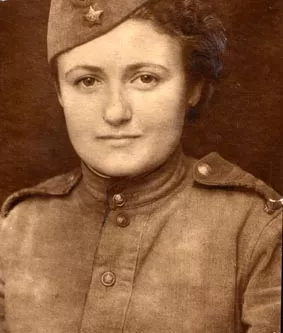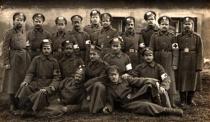This is me in the lines. I was a radio operator. The picture was made by the press photographer, who came in our unit. I sent the picture to my relatives. The picture was made in one of the aerodromes in Belarus in 1943.
In 1939 I was admitted to the Moscow Institute of Steel and Alloys and given a room in the dorms. My life became very interesting. New pals, institute, dorms… I went to museums and theatre with my chums. The calamity came unexpected. It was a weekend day, the 22 of June 1941. We did not have classes at the institute. All of a sudden the secretary of Komsomol Committee came to the hostel and announced that the war had been unleashed.
In a month after the outbreak of war, Germans started bombing Moscow. There was an announcement about evacuation at the institute. We were told that we had to pack only necessary things and take them to the institute. We got on the cars and went to Stalinsk [about 3200 km to the east from Moscow]. Now the town is called Novokuznetsk. Municipal authorities gave our institute two premises -one for classes and another one for hostel. The hostel was very close to institute and it saved us a little bit from severe frosts. Our studies in Stalinsk took its normal course. So, I finished the second course of the institute. I was rather diligent and did well.
We had a feeling that we were living in the rear, and people were fighting in the lines. We were patriots. When the drafting for the girls was announced, before annual exams for the 2nd course a couple of girls and I wrote an application to the military enlistment office asking to draft us in the acting army. In May 1942 we were invited by the military enlistment office. We had to go through a rather rigid medical examination - turning centrifuge and all kinds of other tests. I passed all those tests easily. Only 5 girls were selected out of 10 who applied. We were admitted to school of junior aircraft experts #66, located in the vicinity of Novosibirsk [about 2800 km to the east from Moscow]. We were told that we would be radio operators, but we would not work on the aircrafts, but at the aerodromes. We were supposed to work with aircrafts, aviation headquarters and with aviation in general. We were trained for a year and a half. We were taught by highly skilled officers. We lived in barracks. We had a serious military training. Apart from training on radio operation, Morse code and radio devices, we also had a physical training.
In October 1942 we finished school and I got the rank of sergeant. Five more people and I were sent to the front to the place by Maloyaroslavets, Kaluga oblast [about 115 km to the south- west from Moscow]. We went to Maloyaroslavets by train. We started work at radio station. It was a powerful radio station, installed in a covered truck. It was called battle radio station. Our work was to hear the signals over headphones in the chaos of sounds, respond, connect with the radio station, which was seeking us, and record the message. Good knowledge of Morse code was necessary for that. We really knew it very well. We worked in shifts, each consisted of the chief of radio station, mechanic and three radio operators. We were called radio telegraphists (code operators). Most radio operators were girls, but there were boys as well, but very few. Radio stations were always based on the edge of the aerodrome. I was to be disguised. Battalion consisted of reconnoiters, telephone operators and code operators. There was a cook and some other support staff. On a new position (we were constantly moving towards west) we knew the certain place where we were supposed to settle. The reconnoiterers were to come to the place of the re-dislocation to find a certain place. Besides, if we had to spend a night in the dugs-out, they made bunks for us or perched tents. We worked on field aerodromes.
They were not based on the very leading edge, but close to it. We always were by aerodrome and worked with the aircrafts, taking off from aerodrome. They transmitted messages during reconnaissance or battle. We took the messages and sent them to the headquarters of our battalion.




















